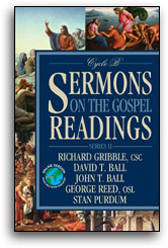SermonStudio
A Healing Ministry For The Modern Church
Sermon
Sermons on the Gospel Readings
Series II, Cycle B
The mission and ministry of Jesus was preaching, teaching, and healing. Preaching and teaching were about the imminent kingdom of God -- Jesus called his hearers to be alert, and to live in anticipation of that great event. The healing ministry of Jesus focused on the miseries of sickness and disease. We moderns are not able to imagine the helplessness those people felt in the face of major and minor diseases afflicting them. They took great pains to search out charismatic healers, hoping for a cure. They yearned for healing.


